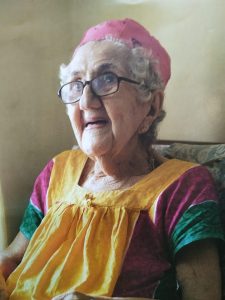
Sarah Cohen
In early July 2018, when I first visited the Paradesi Community in India, I was led after the beautiful Friday night prayer service down “Synagogue Lane” to a small house that stood opposite the home of the head of the community Mrs. “Queenie” Hallegua.
Inside I found Shabbat candles burning and the unfatigued smile of Mrs. Sarah Cohen who at 97 years old looked up at us beaming with tranquility. She was the oldest Jew in the town. We gathered around her and began to sing Shalom Aleichem together. She sang along and genuinely seemed pleased that we had come to see her.
It was explained to me that of all the Jewish residents in Cochin, Auntie Sarah, as she was affectionally known, was the most visited. Tourists from Israel, America, Europe and even from within India came all year round to see her, many bringing flowers, gifts and, more often than not, chocolates.
I was introduced as well to Thaha Ibrahim, a local Muslim who had worked with Mr. Cohen and had been connected with the family since his youth. As a deathbed oath to her husband, he had undertaken to care for Auntie Sarah, and he performed his service with clear diligence and the love of a son towards his parents. To this day, he tends Auntie Sarah’s Embroidery Shop, making the iconic Paradesi kippot, Shabbat table cloths and has in his collection hundreds of articles, photos and volumes of information about the centuries old community.
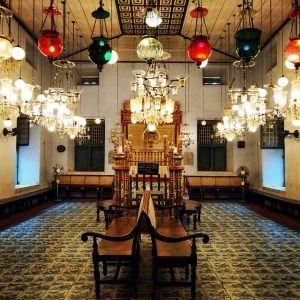
Santuary of Paradesi synagogue
Paradesi Jews were Sephardic immigrants from Spain and Portugal who traded in spice
Later we would walk through the ancient graveyard together, the stones now mostly worn away by time and the monsoon rains. He still knew the identity of almost every stone in the graveyard, the dates and stories of those that history had now mostly forgotten.
As we began our Shlichut at the Paradesi Synagogue (Est. 1568) visiting Sarah became a duty for both my wife and I, one that we undertook lovingly. My wife would visit her multiple times during the week and sit with her as she read from her Siddur, gazing out of the window at the throngs of tourists who visited Jew Town daily.All the while
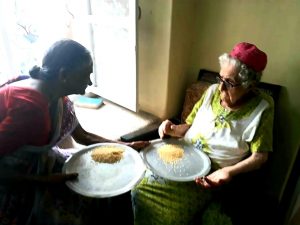
Sarah checking rice
the whirr of the sewing machine would be present as Thaha worked on another kippa, a tablecloth or an Ark cover.I would visit every Friday and Saturday to sing to her and make Kiddush with her. We often brought the various tourists and local Jews to visit Sarah on Shabbat, feeling that not only did she truly enjoy the company, but that the opportunity to meet one of the last Paradesi Jews was of tremendous value to our guests.
As the time went by Auntie Sarah fell deeper into her senility and she seemed more and more detached from her surroundings. However, on Shabbat she seemed to lift out of it and become once again fully aware of who was beside her.
About four hours before Shabbat on Friday, August 30, 2019, I received the painful telephone call from Thaha. It was hard to make out exactly what he was saying through the sobs and tears and I knew I had to go immediately to Sarah Cohen’s house. It was suddenly without the mirth and light feeling, the Singer sewing machine no longer sung, the Shabbat candles were unprepared, Sarah lay dead on her bed covered in a simple white sheet.
What began next was a frantic series of phone calls to organize the Tahara and burial of Auntie Sarah. Because she died so close to Shabbat, I decided to defer the funeral until Sunday. In keeping with Indian law, the body had to be taken to a funeral home until this time and we arranged with Dr Hallegua, the son of the head of the community Queenie Hallegua, and Keith, her neighbor, to accompany her and return just before the Mincha prayer service.
Hashem had prepared a small miracle and it happened that a variety of Mashgichim from the Star-K Kosher Organization were visiting India and were able to extend their stay. Jews from the Malabari community of Ernakulam from the other synagogues of Kerala: The Parur Synagogue, Chendamangalam Synagogue, all confirmed their attendance.
My wife, Elisheva, along with the other Jewish women of these communities came together to perform the tahara, the ritual cleaning of the body according to the ancient local custom.
A special bed with a rope meshed cover was brought out from storage and seven earthenware vessels were filled with fresh spring water, used to clean the body with banana leaves and coconut fibers.
After they were poured the vessels were smashed, we were later told that as soon as the vessels are broken new ones are immediately procured for the next funeral.
The Kochi Jews had a small black book prepared with their mourning custom, chants and the complex procedure and order of the cleaning. Finally, I placed soil from Jerusalem on her eyes and mouth and the ladies wrapped her in the simple white garments that Thaha had made for her according to their custom.
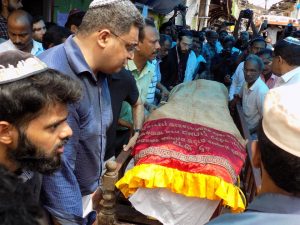
Carrying the Met
Within a short space of time the entire street of Synagogue Lane and all of Jew Town were suddenly filled with people from all walks of life and all over the world. In the outer courtyard of the small house, the Jewish women washed Sarah. The entire house was filled with strangers who had travelled from near and far to pay respects to the woman who had experienced a century of life, the changes in both the Jewish community and the wider India which had become a democracy on January 26, 1950.
Auntie Sarah had seen it all and faced it with the same simple, joyful simplicity.
Once the ladies had finished cleaning and preparing her for the burial she was taken back inside where Yaakov Finkelstein, the consulate general for Israel in Mumbai and a distant relative of Sarah, said a small prayer.
Outside, wreaths and bouquets from the many organizations that both Sarah and her husband had supported were lined up and a mass of shoes of all kinds lay at the threshold. After having sprayed perfume on the body of Sarah, the casket (which had to be re-ordered as they had sent a child sized coffin) was carried to the nearby cemetery on Jewish Cemetery Lane. Thaha Ibrahim spoke in Malayalam about his love for her.
I was asked to speak and to lead certain traditional chants and make the Kaddish for the community. This was followed by a Mincha service at the Paradesi Synagogue,
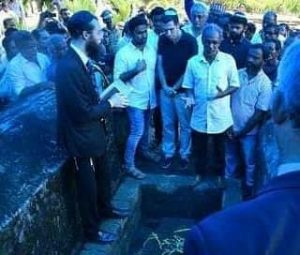
Funeral
which was incidentally the first time that many members of this disparate community had prayed together after years of distance.
It has been seven months since Auntie Sarah passed and the feeling in Jew Town is remarkably upbeat. The tourists still flock daily to see the ancient synagogue and each week travelers and locals come to pray and eat together on the Shabbat and Festivals. Sarah’s shop is still open to buy the iconic Cochin Kippot still made by Thaha.
Life for the last two remaining Paradesi Jews who live on Synagogue Lane is noticeably quieter.
My wife still goes diligently to her house every Friday before the Shabbat services to light Auntie Sarah’s candles and we enjoy a close friendship with Thaha and his family, who continue to honor her memory and to furnish visitors with stories and show them pictures of the changes that have transpired in this small but historic town.
For me, besides the funeral which was, thus far one of the most powerful events of my life, I think often of our relationship with Auntie Sarah and the special personality that she had, her visits to the synagogue during the festivals and the great warmth that so many felt when entering her house to visit her on Shabbat. My wife and I often speak about the funeral and about the Tahara, feeling deeply privileged to have seen the traditional custom and to have been part of the passing not only of Sarah, but of Jew Town as it changes once again from the hub of Jewish activity to a chapter in our collective history. When I think of Auntie Sarah, it is of her radiant smile and all the thousands of people whose lives she touched over almost a century. She is certainly remembered for blessing and peace.
Funeral Youtube video: https://www.youtube.com/watch?v=TE_stnzOJk4&feature=youtu.be&fbclid=IwAR1du8ehwPADXO0i8093DDBgIzjgbsK_gistowotsvURSWT-f9DM9Mahf9c
Note: The above is part of an upcoming book on Rabbi Goldschmidt’s experiences as the Rabbi and scholar in residence of the Paradesi Synagogue in Cochin and his journeys across India.
For information please contact Rabbi.Goldschmidt@gmail.com
